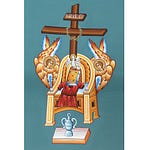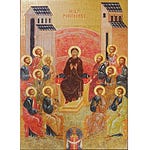As we are using the traditional Western lectionary for our worship on Sundays and Holy Days, starting today and lasting for the next two Sundays is the period of time known as “Pre-Lent.” And these Sundays have funny names, inherited from the Latin language. Septuagesima is Latin for seventieth—that is, approximately seventy days before Easter. Next Sunday is named Sexagesima, which is Latin for sixtieth—that is, approximately 60 days before Easter. The last of the three, Quinquagesima, is Latin for fiftieth—that is, approximately 50 days before Easter.
Do not let the strange Latin names for these Sundays complicate their purpose. The purpose is to prepare us for Lent. It is to move our liturgical contemplation and prayer for the season of Epiphany (which is focused on the manifestation in our midst of God the Son, Jesus Christ, fully God and fully Man) towards the focus of Lent, which is the inner world of the heart, where unseen warfare happens between the Devil and God’s Holy Angels, even the Devil and Christ Himself. What the Pre-Lent season invites us to recognize is that to fully attend to the unseen warfare, we must go on pilgrimage: indeed, that the spiritual life is a pilgrimage to the heart, and through the heart to Jesus Christ. The three Sundays function as a call to pilgrimage, a call to spiritual labor, always a pilgrimage and labour of love, and of loving our Lord Jesus Christ, Who is our strength, our Saviour, our fortress.
This emphasis on pilgrimage comes out in the short passage from 1st Corinthians chapter 9. Saint Paul speaks of spiritual pilgrimage as a race, and he wants us to run the race that we might obtain the prize. The prize is being crowned in the glory of heaven; the prize is that upward call to life eternal in heaven, receiving the same crown as the Saints have already received. That crown is the imperishable wreath Paul speaks of. And so we must run this race, says Paul, and the way we run the race is through discipline of the body and self-control. Every athlete, he says, exercises self-control in all things. So should every disciple. Whereas disciplined self-control by athletes involves muscles and joints, disciplined self-control by Christians involves the heart, and seeks to open the eyes of the heart, open them and keep them open.
This is because we are frail creatures living in a fallen world. This means our hearts are often blind. Blindness of the heart is what the Church calls the inability to perceive or understand the truth about God and our relationship with Him. We all suffer from this condition. We all suffer from blindness of heart in our lives. And this is because, living as fallen creatures in a fallen world, we are plagued by vice and sin.
Part of preparing for Lent is being sober about the human condition, and especially sober about oneself. Vices, or what is called in the Bible “passions,” are unholy habits of thought and action. We all have them, and often our vices are so deeply rooted that we have a very difficult time uprooting them. We are plagued by vice, and we are plagued by sin. Sin is where we knowingly act, whether in deed or even in action of our mind, in a way contrary to God’s will. We all sin, and often our sin is a product of the vices we have, our unholy habits. To be sober about our selves is to be reality-based, and being reality-based is one of the definitions of humility. As Saint John so piercingly wrote: “If we say we have no sin, we deceive ourselves, and the truth is not in us.” And, he could have added, “If we say we have no vice, we deceive ourselves, and the truth is not in us.” But Saint John immediately adds, “If we confess our sins, God Who is faithful and just, will forgive our sins and cleanse us from all unrighteousness.”
This is why we are given the Parable of the Vineyard on this first Sunday of Pre-Lent. There is much symbolism to it. The vineyard symbolizes the task of following God’s commandments. The labour symbolizes our present life. The labourers represent people that in different ways are called to the fulfillment of God’s commandments. And by different ways, is meant are called in different times of their life: some recognize their call early in their life; some in the middle of their life; and others closer to the end of our life. The grumbling that is described as coming from the mouths of those hired first represent the vices of indignance, of envy, of jealousy, and the like; all of which are related to pride and forms of it. These are very ordinary vices, and these are common to the experience of the Christian life. The vast majority of Christians do not suffer from spectacular vice and sin; rather, the vast majority of Christians are very unspectacular and boring in the pride.
As the Venerable S. Bede teaches, “Among the works of faith humility reigns in a special way.” What counters pride and prideful vice is faith in God and trust in His goodness, trust that His goodness will deliver us, will save us, from our vice and sin. With our faith in God strong and our trust in Him full, our life in Christ becomes humble, recognizing that we depend on God for everything: our very life, all good things that we do, even every breath we take—all depends upon God and on Him alone. To know this is humility. What counters pride and prideful vice is loving Christ, and seeing Him as our strength: seeing Him as our rock: seeing Him as our defense: seeing Him always as our Saviour, Jesus Christ, Who always hears our voice, for He is God, Who lives and reigns with the Father in the unity of the Holy Ghost, ever one God, world without end. Amen.











Share this post